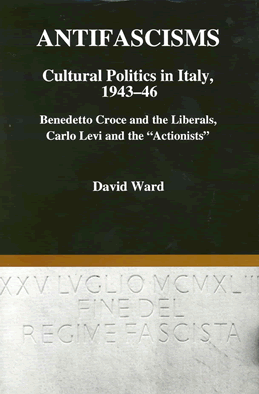


Antifascisms
Cultural Politics in Italy, 1943-46
Benedetto Croce and the Liberals, Carlo Levi and the
"Actionists"
by David Ward



Antifascisms
Cultural Politics in Italy, 1943-46
Benedetto Croce and the Liberals, Carlo Levi and the
"Actionists"
by David Ward

"This book is an in-depth analysis of three of the most crucial years in twentieth-century Italian history, the years 1943-46. after more then two decades of a fascist regime and a disastrous war experience during which Italy changed sides, these years saw the laying of the political and cultural foundations for what has since become known as Italy's First Republic. Drawing on texts from the literature, film journalism, and political debate of the period, Antifascism offers a thorough survey of the personalities and positions that informed the decisions taken in this crucial phase of modern Italian history.
Arguing against the overly simplistic view of the Italian resistance to Fascism that has at time emerged from historiography, literature and films of the immediate postwar years, this book focuses on the tensions that riddled and ultimately undermined the unity of intent of Italy's anti-Fascist political parties Ð grouped together in the alliance known as the Committee for National Liberation. Within the alliance, two main, and contrasting, groups are identified: a first, more moderate group on anti-Fascists, composed mainly, but not exclusively, of Italian liberals, for whom pre-Fascist Italy provided a workable model on which two base post-Fascist society; and a second, more radical, group, formed mainly around the Partito d'azione (Action Party), whose picture of postwar Italian society owed nothing and bore little resemblance to pre-Fascist Italy. For the former, pre-fascist Italy was the answer to Italy's postwar problems; for the latter, pre-Fascist Italy itself was the problem, its democratic limits providing the kind of fertile terrain on which, they feared, Fascism in another form could grow.
These contrasting pictures of what postwar Italy should look like, the author argues, are themselves contingent on a prior analysis of Fascism. If for moderate anti-Fascists, Fascism had been nothing other than a virulent parethesis in the course of Italian and European history, for the more radical anti-Fascists, Fascism, which they saw as the logical result of the deeply flawed historical cycle that had brought Italy from the Risorgimento to the present, was anything but an aberration. Far from being a phenomenon extraneous to Italian history, Fascism was Italian history, Italy's autobiography, the revelation of what had always lain beneath the nation's surface.
Antifascisms examines how these mutually exclusive standpoints impacted on the political reality of the 1943-46 period and on the crucial decisions that marked those years: the drafting of the Constitution, the founding of the Republic, and the amnesty that reprieved Fascist collaborators."
| Home | Bio Info | Books | Courses at Wellesley | Resume | Wintersession | Italian Studies Dept |
|---|